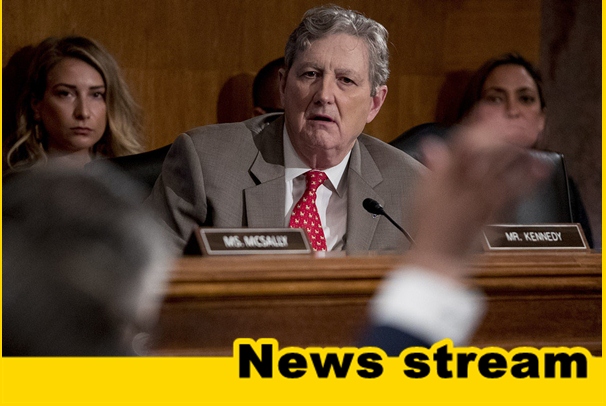
The U.S. housing finance system is worse off today than it was on the cusp of the 2008 financial crisis, Republican lawmakers and Trump administration officials warned on Tuesday.
Fannie Mae and Freddie Mac, the two government-controlled enterprises that stand behind half the country’s mortgages, are way too undercapitalized, and lending standards have actually deteriorated since the housing crash, the officials said.
“This whole thing is a car wreck. It’s a dumpster fire,” Sen. John Kennedy (R-La.) said at a Senate Banking Committee hearing on the White House’s proposal to overhaul the way the nation finances mortgages.
“We spent $190 billion of taxpayer money, and we’re in worse shape,” he said, referring to the bailout of Fannie Mae and Freddie Mac, which were seized by Treasury a decade ago to stave off catastrophic losses in the crisis.
The hearing kicked off what promises to be a highly contentious debate over the plans released last week by the Departments of Treasury and Housing and Urban Development to scale back the federal government’s massive role in the mortgage market. Republicans are focusing on what they say are growing risks in the system, while Democrats are mostly concerned about providing affordable housing.
The Treasury blueprint would overhaul Fannie and Freddie before releasing them from government control. A major component of the plan is building the companies’ capital so they would be able to withstand an economic downturn without turning to taxpayers again.
Right now, the companies are only allowed to retain a combined $6 billion in capital despite owning or guaranteeing $5.5 trillion of mortgages.
“I will tell you as a safety-and-soundness regulator, when I look at a $3 trillion institution that is leveraged 1,000 to 1, it keeps me up at night,” Federal Housing Finance Agency Director Mark Calabria, the companies’ regulator, told the committee.
“If we do nothing, this is going to end very badly,” he added.
What’s more, Fannie and Freddie are less equipped for a downturn now than they were before the crisis, Senate Banking Chairman Mike Crapo (R-Idaho) said. Before 2008, he said, the companies held 45 cents in capital for every $100 in mortgages; today that figure is 19 cents.
Treasury Secretary Steven Mnuchin, HUD Secretary Ben Carson and Calabria all agreed with Crapo’s assessment that the GSEs “are systemically important companies [and] that they continue to be too big to fail.”
Yet when Sen. Mark Warner (D-Va.) pressed Mnuchin and Calabria on whether the Financial Stability Oversight Council, the uber regulator created after the crisis to spot emerging risks in the financial system, should subject Fannie and Freddie to greater oversight, they rejected the idea.
“Before we raised public capital, we would make sure we understood that there was enough capital so that they did not need to be designated” as „systemically important“ by FSOC, Mnuchin said.
“It appears to me from your administrative proposals, we could end up with a system that actually doesn’t end too-big-to-fail and doesn’t increase affordable access to credit — that is a grave concern to me,” Warner said. The administration’s plan, he said, is “going to put us right back to where we were prior to 2008.”
Mnuchin disputed Warner’s characterization, and he and Calabria emphasized that the White House plan includes reforms to reduce the risk in the companies’ portfolios.
As it stands, underwriting standards at Fannie and Freddie have “gotten worse, not better,” Calabria said, pointing to a “massive expansion” of loans with high debt-to-income ratios in recent years.
“What you’re describing today sounds even more dangerous than the conditions that we had prior to the last crisis,” Sen. Martha McSally (R-Ariz.) said. “How is it that reforms haven’t been made in order to prevent us being in similar conditions?”
Carson said reforms at the Federal Housing Administration have brought down delinquency rates.
Efforts to reduce risk, though, would inevitably result in fewer people getting mortgages — a point Democrats on the committee made repeatedly.
When Sen. Jack Reed (D-R.I.) pressed the officials to identify people who would not be able to get mortgages under the plan, Mnuchin said “there may be certain people today who really shouldn’t get a mortgage because they can’t afford them.”
Carson agreed.
“Certainly there are some people who probably should not be mortgage owners — in many cases very disabled people, elderly people, people who are drug-addicted, who are not going to be able to make the payments,” Carson said. “We have other programs for individuals like that.“
Source: politico.com
See more here: news365.stream






